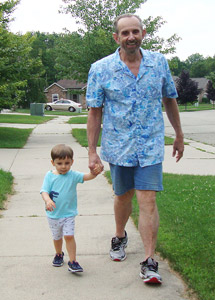Last week the health headlines shouted “Study Shows Over 90% of All Americans Are Overfat!” The rate of overweight as assessed by Body Mass Index (BMI) is already 70%; now scientists want to say even more people are too fat? What’s going on? I’ll explain what overfat means first and then tell you about the study behind it.
For the most part, the greater the BMI, the greater the risk for cardiovascular disease, prediabetes, and hypertension. For those of you who aren’t sure of your BMI, check out your BMI in the Health Info section of our website. And if you think you’re just big boned, we show you how to prove it.
But there are people who have a normal BMI under 25.0 but still may be overfat. Considering Waist Circumference in addition to BMI may help but that could still miss some people. How? They may have lost muscle mass; the subtle loss of lean muscle with a gain of fat could lead to overfatness. That increases their risk for the diseases I mentioned earlier.
Here’s the most common example of someone who has a normal BMI but is overfat: a very sedentary elderly person who looks slim, but has very little muscle. As the saying goes “use it or lose it” and they’ve lost it.
A clinician from Arizona has taken it upon himself to redefine the terminology associated with excess body fat. He claims that overfatness gets missed in too many people. The problem he sees is that people who could begin treatment with diet, exercise, and medication if necessary are being missed. He outlined his arguments in a paper published in January 2017 (1), but it was his paper published in July that lead to headlines (2).
He and his co-authors examined the BMIs of people in countries all over the world. Using prior studies that estimated the number of normal-weight people who are overfat, ranging from 9.7% to 20%, he then applied that to the normal-weight populations (as assessed by BMI) in the top 30 developed countries in the world. That’s how they derived the headlines of over 90% overfat—not just in the U.S. but also New Zealand, Iceland, and Greece as well. To be fair, this applied only to males. Don’t rest on your laurels, ladies. All the same countries were greater than 80% for females.
The Problems
There are three with his approach in my opinion. First, adding another definition to replace BMI doesn’t really help people or their physicians as he implies. Confirming a person with normal BMI is overfat would require a more advanced exam or assessment of body fat. I’m not sure that’s practical.
Second, I looked at his work from every direction and couldn’t get the numbers to work. If 70% of Americans are overweight or obese and you add 20% of the remaining 30%, it adds up to 76% not 90%. Even if the numbers worked, the statistic would apply to a physician’s total number of patients. There would be no way to identify who is overfat without additional testing.
Third, there’s another group that needs to be addressed, and that would be those who are overweight according to their BMI but are metabolically healthy. In fact, that’s a significant problem today. Even after losing over 30 pounds, my BMI is still in the overweight category. By every test of metabolic fitness—blood pressure, cholesterol, HbA1c, or insulin—I’m at no additional risk of heart disease, yet I’m still classified as “at risk” due to my BMI. I think that’s a greater issue and will be more so as healthcare gets debated. Is your BMI over 25? You’ll pay more, even if your test results are stellar.
The Bottom Line
I agree with the concept that the author put forth: there are people with normal BMIs that are overfat, and they’re at greater risk for CVD and metabolic diseases. But new definitions aren’t necessary. What is necessary is identifying who is at risk. That will only occur when doctor and patient meet face to face. When was your last doctor’s appointment?
What are you prepared to do today?
Dr. Chet
References:
1. Front. Public Health 4:279. doi: 10.3389/fpubh.2016.00279.
2. Front. Public Health 5:190. doi: 10.3389/fpubh.2017.00190.

